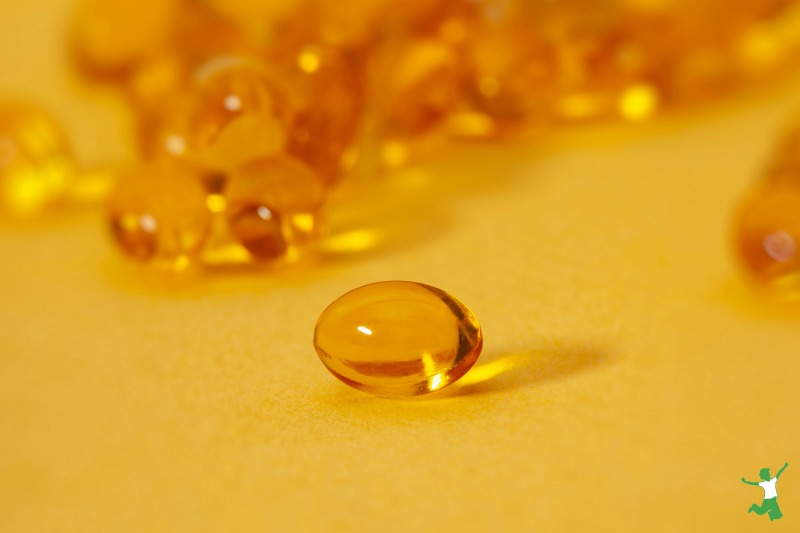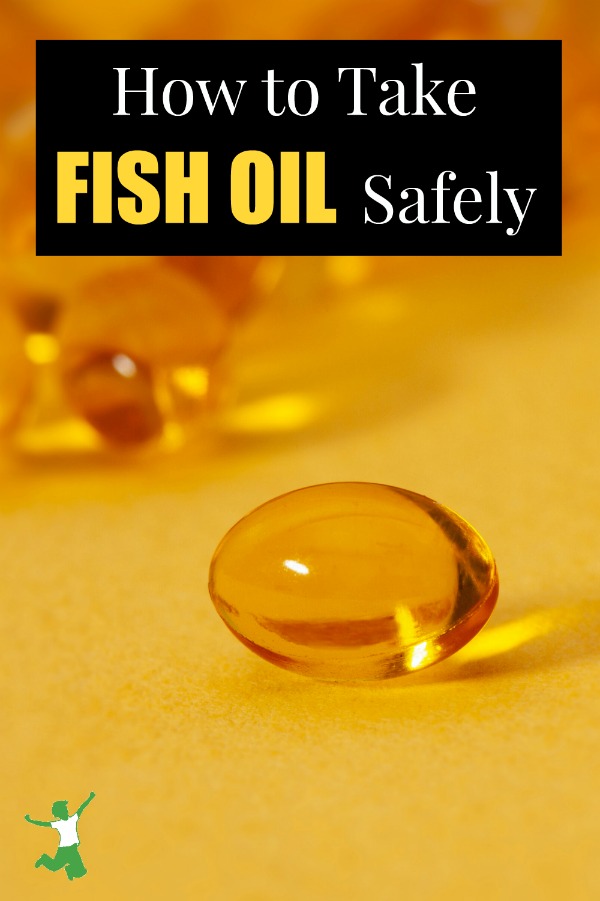Omega-3 fats taken as fish oil are popular for many health conditions, but consumed as part of a conventional diet can actually do more harm than good.

Omega-3 fats are certainly the darling of conventional and alternative medicine alike. Fish oil loaded with heart-healthy “good fats” are flying off the shelves of healthfood stores and are prominently featured on supplement displays in many doctors’ offices.
You can even buy fish oil capsules at Wal-Mart!
Health Benefits of Omega-3 Fats
There is certainly little doubt that omega-3 fatty acids are important to health. According to Dr. Joseph Mercola, omega-3 fats are:
…significant structural components of the cell membranes of tissues throughout the body and are especially rich in the retina, brain, and sperm, in which docosahexaenoic acid (DHA) constitutes 36.4% of total fatty acids. (1)
Conventional sources like WebMD concur, stating that studies have shown that omega-3 fats can: (2, 3)
- Lower blood pressure
- Reduce triglycerides
- Slow the development of plaque in the arteries
- Reduce the chance of abnormal heart rhythm
- Reduce the likelihood of heart attack and stroke
- Lessen the chance of sudden cardiac death in people with heart disease
Fish Oil Contraindications
While there is little dispute on either side of the medical aisle about the necessity of omega-3 fats in the diet for optimal health, consumers need to be aware that there are pitfalls associated with these good fats. This is particularly true for vegetarians or those who otherwise consume a nutrient-poor Standard American Diet (SAD).
First of all, it is not wise to consume the high heat processed, industrialized fish oils that take center stage on supplement shelves at the store and in doctors’ offices. High heat processing destroys the benefits of fish oils. The delicate omega-3 fats are highly subject to rancidity from heat.
In fact, some would argue that taking fish oil does more harm than good as the good fats oxidized by processing become loaded with free radicals and when consumed regularly can contribute to aging and the development of chronic disease.
Even consumers who make the effort to source omega-3 fats rendered with no heat in the form of virgin high vitamin cod liver oil as prized by Traditional Societies such as the South Sea Islanders studied by Dr. Weston A. Price need to exercise caution.
The omega-3 fats EPA (eicosapentaenoic acid) and DHA (docosahexaenoic acid) can actually contribute to health problems when not balanced by other important fatty acids in the diet.
The Journal of Nutrition Research reports that intake of DHA and EPA is associated with an increased risk of hemorrhagic stroke in rats. People on anticoagulant drugs need to be especially careful. EPA and DHA may cause the blood to thin and trigger excess bleeding. (4)

Arachidonic Acid Key to Avoiding Omega-3 Supplementation Risks
How does a savvy consumer obtain the numerous health benefits of omega-3 fats DHA and EPA with no downside risks?
The key is to balance the intake of omega-3 fats in whole foods and traditionally rendered oils with the omega-6 fat arachidonic acid (ARA). Foods rich in ARA include meat fats, eggs, and liver. These are the very foods eschewed by conventional dietary sources…the same ones recommending a daily ration of industrialized fish oil!
It is especially important for pregnant women who supplement with fish liver oils to consume meat fats, eggs (yolks), and liver.
The Weston A. Price Foundation reports that cod liver oil containing substantial levels of omega-3 EPA can actually contribute to hemorrhage during the birth process. (5)
This risk is mitigated by arachidonic acid (ARA), an equally important omega-6 fatty acid found in liver, egg yolks, and meat fats. It is not found in any plant-based foods with the exception of moss and algae. (6)
For this reason, pregnant women taking cod liver oil to benefit themselves and their baby must be sure to follow a Traditional Diet during pregnancy and nursing. Just taking cod liver oil as part of a nutrient-poor, ARA deficient conventional diet is unwise.
So bring on those heart-healthy omega-3 fats! Let’s all be sure, however, to consume them as part of a diet that also includes meat, liver, and eggs as wisely demonstrated by chronic disease-free Traditional Societies.
References
(1) Omega-3 Benefits and Supplementation
(2) Fish Oil Supplements for High Blood Pressure
(3) Omega-3 Fatty Acid Fact Sheet
(4) Polyunsaturated Fatty Acids Increase Oxidative Stress in Rats
(5) Pregnancy and Lactation Diet
(6) Arachidonic Acid Food Sources
More Information








If omega 3 fats could be dangerous to our health, then how much omega 3 per day should we be having?
Great information. Thank you!
Does High heat mean the same as moleculary distilled? And are borage and primrose oils considered to be good omega 6 oils to combine with cod liver oil? I’m definitely going to start making my own raw butter after seeing how easy it is.
thanks!
Great article. Would like to mention only high levels of mercury found in big fish is dangerous, but not in small fish like Mackerel, mullet, Salmon etc. Also its important to source it from healthy places around the world. So do your research carefully when selecting omega 3 where its sourced from.
Since you are commenting on an area that you know little about you should do some research before misinforming others, Sergio.
Large and small fish are swimming in a sea contaminated with plastic and toxic substances. Mackerel is one of the most contaminated…
The high temperatures used to can fish like salmon may destroy much of the benefit of the fish oil.
Studies have indicated that fish oil supplements do not lower the risk of heart disease. It could well be something else in the fish that is good for the heart like Omega-7 that is missing in fish oil supplements. As is often the case, a fish oil supplement does not replace the whole food.
The GAPS diet recommends taking a fish oil supplement along with CLO, so this article confuses me…are there any safe brands out there? I have been taking ‘Eye-q’ capsules
this is interesting. I have been studying traditional diets recently, and have been taking fermented cod liver oil/ high vitamin butter oil gel. I do eat eggs, and drink raw milk, and bone broth, but I am vegetarian otherwise (i was raised that way). All that i have read so far indicates that a teaspoon of fermented cod liver oil should be a sufficient supplement to a a diet including pastured animal products, even for a nursing mother. Is this teaspoon a small enough amount not to throw things off? and if not, what ratios of animal products to fish oil do you recommend? do they need to be eaten together? thank you for the article
Tony Pantalleresco (“The Remedy” program on The Micro Effect) says to avoid fish oil because the mercury simply can’t be filtered out. I take an algae-baed Omega-3 called Ovega. Tony also recommends walnut oil and grass-fed butter as good sources of Omega-3. Thanks for the informative article!
I also would like to know what about the canned sardines and salmon.
Sarah, what does this mean for Vital Choice’s Salmon Oil? It says it is “extracted at temperatures below 225 degrees F” and “cold-filtered”. Vital Choice is a great company, but I’m unsure about this. We’ve been taking the salmon oil/vitamin d supplement for a few months.
225F is very hot .. much higher than pasteurization temperature! I personally would never buy it.
Does high vitamin butter oil have the ARA fats needed to balance the FCLO and eliminate possible hemorrhaging during pregnancy/birth? I’m 7 weeks pregnant and eat meat and eggs (though no liver). I also take FCLO and high vitamin butter oil daily. But the possibility of hemorrhaging is scaring me.
I have the same question as Kathy and Kathleen. Does anyone know the answer? I’ve been taking taking FCLO with high vitamin butter oil faithfully throughout my pregnancy. I have lots of meat and eggs in my diet, but almost no liver. I’m scared of hemorrhaging as I have only 6 wks to my due date.